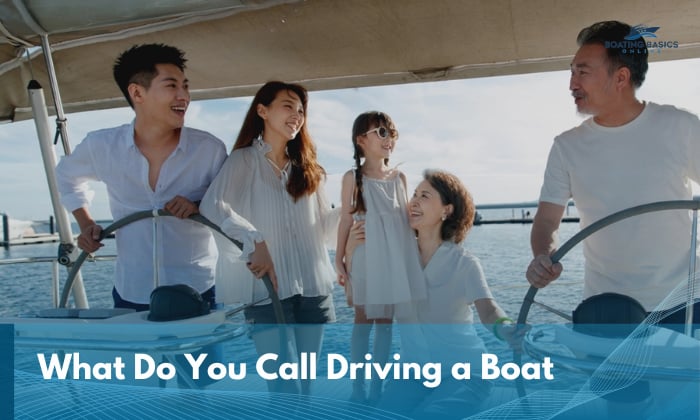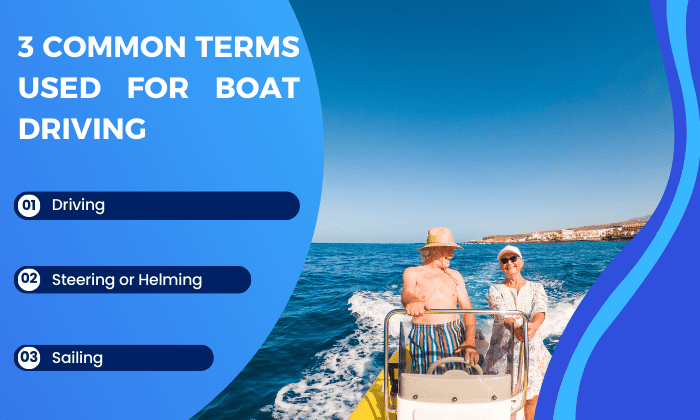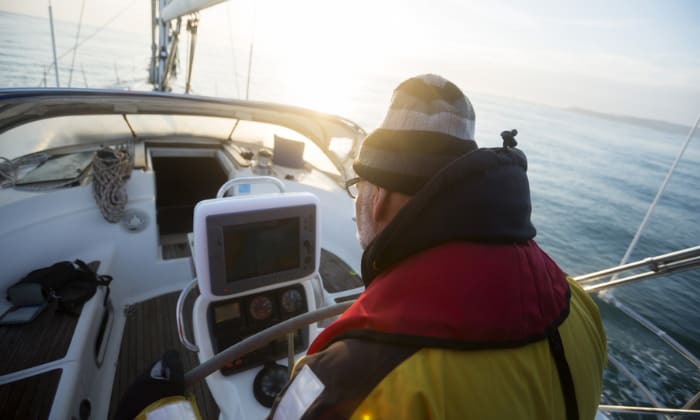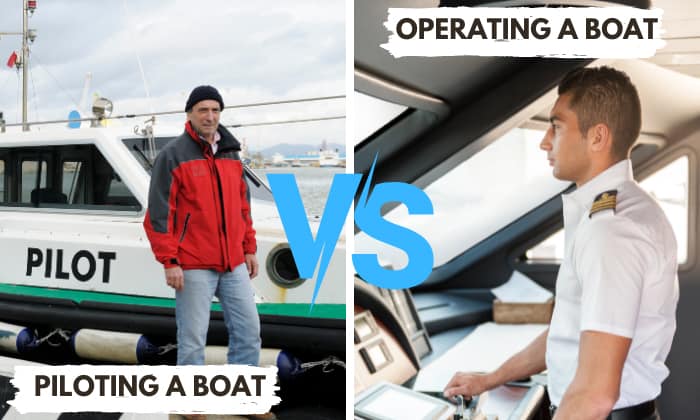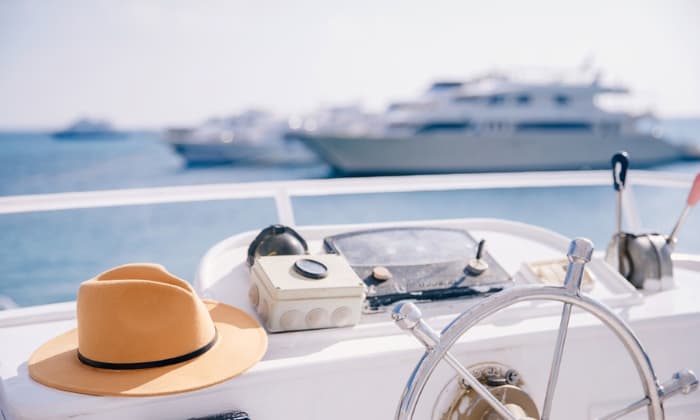We can get so caught up in boating that it becomes like breathing for us. It becomes second nature to the point that we forget there’s an actual term or (terms) for what we’re doing.
Some may dismiss it as a shower thought. But more than a handful of people out there want to know the answer to, “What do you call driving a boat?”
Generally, terms like “piloting”, “navigating”, “steering”, “driving”, or “operating” will do.
You’ll be surprised to know that there’s more, though.
Table of Contents
Common Terms Used for Boat Driving
While the common driving terms above may be used interchangeably, they do have subtle differences.
- Driving
When you drive a boat, it’s used in the same context as “driving” a car. You steer and control the vessel’s speed or sails. It’s the most colloquial term out of all these.
- Steering or Helming
Steering a boat is more concerned with the manual act of changing the watercraft’s direction. It often connotes turning its rudder or steering wheel to get where you want to go.
There’s also technology that’s called “hydraulic steering”, which is essentially an autopilot system designed for most sailboats. Obviously, it takes most of the burden of steering away from the skipper.
Merriam-Webster dictionary says “helming a boat” is the same as using the rudder, so feel free to swap between the two every time you use that nifty implement.
- Sailing
This is seldom used as, technically, it only applies to a vessel that has a sail, i.e. a sailboat or yacht that mainly relies on it. It would be entirely awkward to say that you’re “sailing” a primarily motor-driven watercraft that has no sails in it.
To sail a boat also doesn’t automatically mean you’re directing its motion. You could very well just be one of its passengers.
Regional Variations in Terminology
Skippering or Captaining
Look up boat driver name online, and you’ll likely get “skipper” or “captain” as the answer. Either one can be used as a boat driver synonym.
As a result of their popularity, “skipper a boat” and “skippering a boat” are also commonly-used terms, especially in certain specific regions within various boating circles. The same goes for captaining it.
Both mean the same thing as piloting or driving a boat.
Technical Terms for Operating a Boat
To pilot or navigate a boat is a more technical and formal term. When we say we’re navigating our boats, we almost always mean that we’re using charts, compasses, and GPS systems for the job. We navigate to understand the direction we need to go relative to the vessel’s position, wind, tides, and current.
Still, to pilot a boat is arguably a more apt answer to “What’s driving a boat called?” since, for one, it doesn’t imply something vague (like driving) or specific (like sailing or rowing) and steering it with a rudder.
2. Conning
Conning is a more specialized or technical term used in the context of larger vessels like ships and submarines. Typically, a conning officer will be assigned to oversee the navigation of the vessel from the bridge.
Difference Between Piloting and Operating a Boat
“Operating a vessel” is undoubtedly a term we’re more prone to encounter when we’re studying legal literature concerning just that. “Boat operator” also has a more formal touch to it than “skipper”, “driver”, or “captain”. The same can arguably be said for a “boat pilot”.
However, if we’re talking about specific boating roles assigned to a “boat pilot” and “boat captain”, there are distinctions you should be aware of.
- A boat pilot could mean someone in charge of ensuring the safe passage of ships from and into ports. They’re usually hired by port authorities to fulfill that specific responsibility.
- A boat captain relates more to a ranking officer onboard a ship. They’re not only in charge of navigating the watercraft but managing the crew, maintaining equipment, communicating with passengers, and making sure that the vessel adheres to maritime laws as well.
So the next time you contemplate the different answers to “What’s a boat driver called?”, take a moment to consider the nuances in these terms. These subtleties only make the cultural richness of the boating world all too apparent.
Alternative Terms for Specific Types of Boats
To highlight that richness, allow me to outline a plethora of other terms that we call our boats, especially based on their purpose:
- Motorboat – high-powered vessel run exclusively by a motor or engine.
- Fishing Boat – any boat that can take part in fishing activities.
- Canoe – can be a kayak or outrigger/dugout canoe used in lightweight water activities. Usually propelled using paddles.
- Jet ski – a PWC ridden like a motorbike and powered by a specialized jet engine.
- Barge – flat-bottomed watercraft meant to transport passengers and goods on rivers.
- Houseboat – a boat designed to be a permanent mobile dwelling place.
- Cabin Cruiser – medium-sized boat that can be used for recreational activities like fishing and cruising.
- Deck Boat – recreational vessel characterized by wide, open decks with luxurious seating arranged to encourage socializing.
- Dinghy –an inflatable boat typically used for lightweight activities and short trips.
- Center Console – characterized by a steering console for convenient and optimal navigation.
- Jon Boat – a flat-bottomed boat typically utilized in fishing in shallow waters.
- Yacht – big-ticket vessels that have premium amenities and sleeping quarters.
- Catamaran – distinguished by its two parallel hulls supporting a single deck.
- Bowrider – open bow motorboat similar to deck boats and cabin cruisers.
Frequently Asked Questions
What do you call a boatman?
A boatman can be referred to in various terms depending on the location and context. He or she can be called the boater, sailor, mariner, skipper, captain, waterman, ferryman, gondolier, punter, oarsman (or oarswoman), sculler, or paddler.
What’s sure is that any of those labels can be associated with a person guiding the movement of a boat over water.
Driving or riding? What’s the difference?
Whether you drive a boat or ride a boat mainly depends on whether you are its operator or passenger. Driving implies having control over the vehicle while riding promptly connotes solely being its passenger (i.e. having no control over where or how it moves).
Conclusion
Ultimately, to drive or pilot a boat means the same thing in the greater view of things. If you’re an officer in the Navy or US Coast Guard, it’s entirely appropriate to use more formal terms like “navigating” and “conning”.
On the whole, regardless of what you think is the most correct answer to “What do you call driving a boat?”, the fact that you have more than one to choose from already means you shouldn’t really stress about it too much.

“My intention from the first day establishing Boating Basics Online is to provide as much help as possible for boaters who want to experience a first safe and convenient trip. So feel free to join us and share your beautiful journeys to the sea!”

